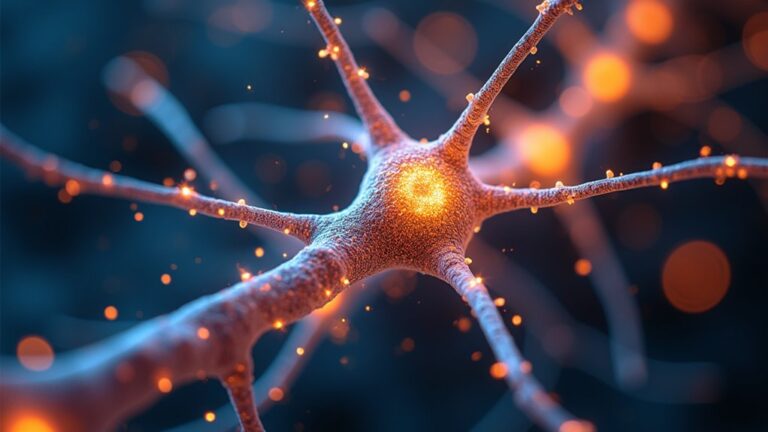DMAE, a compound naturally found in the brain, has gained attention as a potential support for ADHD symptoms like focus and impulsivity. Some research suggests it could help with neurotransmitter function, though studies remain limited. While some users report improved attention, others experience side effects like headaches or insomnia. Safety concerns exist, especially for those with certain health conditions or on medications. Comprehending its effects requires a closer look at the science and real-world experiences.
Understanding DMAE and Its Role in ADHD
DMAE, a naturally occurring compound in the brain, has gained attention for its potential role in managing ADHD symptoms. Research suggests DMAE may support cognitive performance by boosting acetylcholine, a neurotransmitter linked to attention span and focus.
Some studies indicate it could improve membrane fluidity in brain cells, enhancing communication between neurons. While initial findings show promise in reducing hyperactivity, the evidence remains inconclusive, requiring further research to confirm its effectiveness. DMAE’s neuroprotective effects also interest scientists, though its long-term impact on ADHD is unclear.
Possible side effects, such as headaches or irritability, warrant caution. Understanding DMAE’s mechanisms helps clarify why it’s explored as an alternative for ADHD, but professional guidance is essential before use.
Disclaimer : Without Doctor consult , you can’t take this and first talk with your doctor first.
Potential Benefits of DMAE for ADHD Symptoms
DMAE can help improve focus and memory in individuals with ADHD, which are common challenges they face. It could support neurotransmitter function, potentially aiding in better brain communication.
This could result in reduced symptoms and improved daily functioning.
Boosts Focus and Memory
Several potential benefits of DMAE for ADHD symptoms center on its ability to support focus and memory. DMAE can boost acetylcholine levels, a neurotransmitter crucial for attention and cognitive function, which are often impaired in ADHD. By enhancing acetylcholine, DMAE could help sharpen focus and improve memory retention.
Its neuroprotective properties might also shield brain cells from oxidative stress, potentially supporting long-term brain function. While research is limited, some studies suggest DMAE could ease ADHD-related inattention. However, its exact mechanisms remain unclear, and more evidence is needed.
For those exploring natural options, DMAE’s role in neurotransmitter balance offers a promising, though not definitive, avenue for managing ADHD symptoms. Always consult a healthcare provider before trying new supplements.
Enhances Neurotransmitter Function
Neurotransmitters act like messengers in the brain, and when they’re out of balance, ADHD symptoms like inattention or restlessness can flare up. DMAE might support neurotransmitter function by boosting acetylcholine, a key player in attention and cognitive function.
It crosses the blood-brain barrier and contributes to choline production, which the brain converts into acetylcholine. Greater levels of this neurotransmitter could stabilize neuronal signaling, potentially improving focus and reducing hyperactivity in ADHD.
While research is still emerging, DMAE’s role in enhancing neurotransmitter activity makes it a promising candidate for managing symptoms. By supporting clearer communication between brain cells, it could help individuals with ADHD process information more efficiently, easing daily challenges.
Safety Considerations and Side Effects
While DMAE could offer benefits for ADHD, it’s crucial to ponder potential side effects like headaches or insomnia. Precautions should be taken by certain groups, including pregnant women or those with specific medical conditions.
Additionally, DMAE has the potential to interact with medications, so consulting a healthcare provider before use is strongly recommended.
Potential Side Effects
Because DMAE is sometimes used to support focus and cognitive function, it’s crucial to comprehend its potential side effects before attempting it. The National Institutes of Health (NIH) highlights risks such as headaches, insomnia, and muscle tension.
Some people also report irritability or stomach issues. Those with epilepsy or bipolar disorder should avoid DMAE, as it might worsen symptoms. Safety concerns include interactions with medications like antidepressants or ADHD treatments, so consulting a healthcare professional is necessary.
Being cautious helps minimize adverse reactions, especially for those on other therapies. While DMAE could offer benefits, weighing the side effects guarantees informed decisions. Transparency about risks fosters better outcomes, making discussions with a provider paramount before use.
Usage Precautions
Since DMAE has potential effects on brain activity and overall health, comprehending its usage precautions is key to safe supplementation. Individuals with schizophrenia or tonic-clonic epilepsy should avoid DMAE due to its cholinergic activity, which might worsen symptoms.
Common side effects like headaches, insomnia, muscle tension, irritability, and gastrointestinal upset could occur, especially at higher doses. Those taking anticholinergic, cholinergic, or antidepressant medications should consult a healthcare provider, as DMAE could interact with these drugs.
Pregnant or breastfeeding women are advised against its use due to insufficient safety data. Starting with a low dose and monitoring for adverse reactions is recommended. The National Institutes of Health highlights these risks, emphasizing the need for caution. Always seek professional guidance before using DMAE, particularly for ADHD management.
Drug Interactions
DMAE’s potential interactions with medications and its side effects require cautious attention, especially for those managing ADHD. As a choline-related compound, DMAE might affect brain chemistry, potentially altering the effects of other medications.
It could interact with anticholinergic or cholinergic drugs, antidepressants, or stimulants used for attention deficit hyperactivity disorder (ADHD). Side effects like headaches, insomnia, or irritability may exacerbate cognitive symptoms in individuals with deficit hyperactivity disorder.
People with epilepsy or bipolar disorder should avoid DMAE due to its stimulant-like properties. Pregnant or breastfeeding women should also steer clear. Consulting a healthcare professional before use is vital to avoid health risks. Monitoring for adverse reactions guarantees safer integration with existing treatments, balancing potential benefits with safety.
Recommended Dosage and Usage Guidelines
As you contemplate DMAE for ADHD, it is vital to adhere to dosage recommendations meticulously to guarantee safety and efficacy. The suggested range for DMAE supplements is 100-500 mg daily, split into smaller doses. Starting low—around 100 mg—and slowly increasing allows the body to adjust while minimizing potential side effects.
Though it supports brain health by aiding acetylcholine production and acts as a mental booster, interactions with medications or conditions like epilepsy warrant caution. Consulting a healthcare provider before use confirms personalized guidance, particularly for long-term intake.
While studies on choline in rats hint at its potential benefits, human applications require careful dosing to balance cognitive support and skin health without unintended risks. Always prioritize professional advice.
Scientific Research and Evidence on DMAE
Research on DMAE’s effects for ADHD remains limited, but preliminary studies suggest potential cognitive advantages. Some scientific research indicates that dimethylaminoethanol (DMAE) might assist with learning and behavioral problems by supporting brain function.
A few studies propose DMAE supplementation could aid in managing ADHD symptoms, though results are mixed. The National Institutes of Health highlights DMAE as a cholinergic medication for antipsychotic-induced cognitive issues, but its role in ADHD is less apparent.
While evidence is sparse, DMAE is sometimes grouped with cognitive enhancers due to its possible influence on focus and memory. More rigorous studies are needed to confirm its effectiveness for ADHD specifically, as current findings are introductory. Users should interpret early research cautiously until further evidence emerges.
Alternatives and Complementary Approaches to ADHD Management
Several alternatives and complementary approaches can help manage ADHD symptoms alongside or in place of traditional treatments. Cognitive behavioral therapy (CBT) improves focus and impulse control by addressing thought patterns.
Dietary changes, like reducing sugar and adding omega-3s, could support brain function and skin health. Exercise boosts brain activity, while mindfulness amplifies learning and emotional regulation. Herbal supplements, such as ginkgo biloba, function as cognitive enhancers, though research is limited. DMAE might help improve attention by increasing acetylcholine levels, which aid memory and learning.
Parent training programs equip families with practical strategies. These methods, combined with healthy habits, help safeguard mental clarity and overall well-being. While not replacements for medical care, they offer additional benefits for managing ADHD effectively.
Conclusion
Guiding ADHD with DMAE is like tending a delicate garden—it demands tolerance, care, and the proper environments to flourish. While DMAE can provide a gleam of promise for more intense concentration, it’s not a magical seed. Science still hydrates the roots of comprehension, and caution remains the fence against potential storms. For those investigating this path, professional direction is the compass, ensuring security while fostering development. The expedition continues, one stride at a time.





